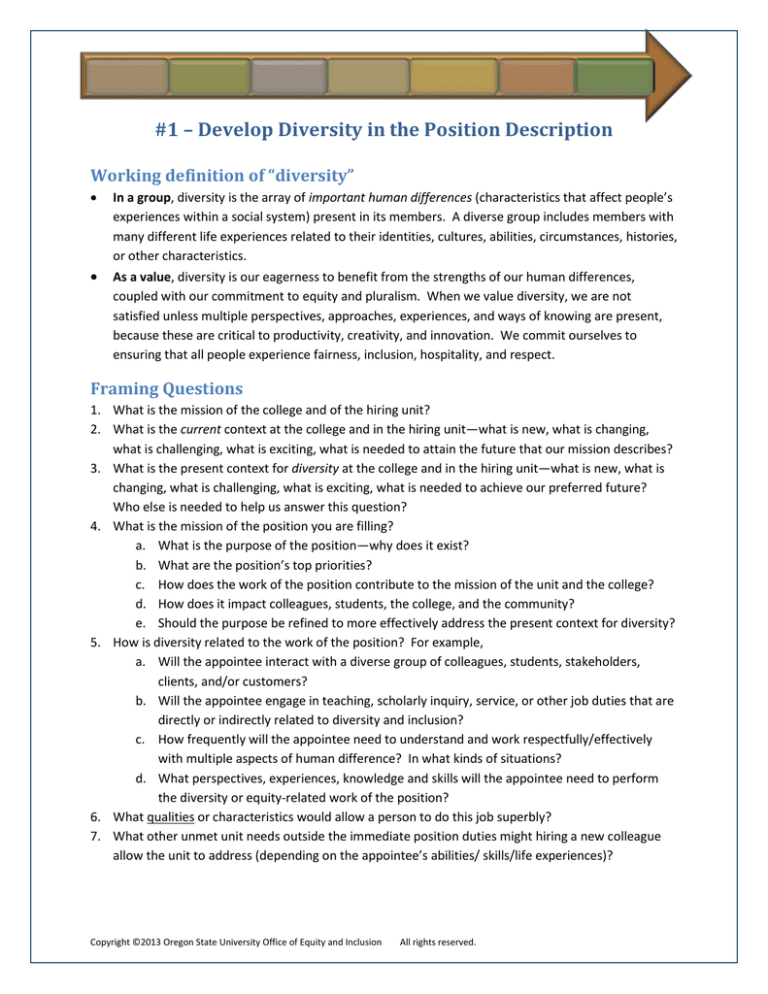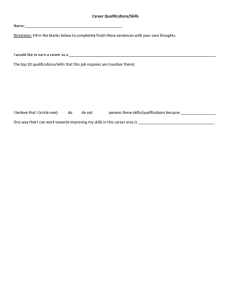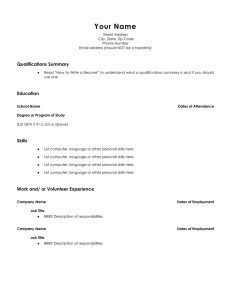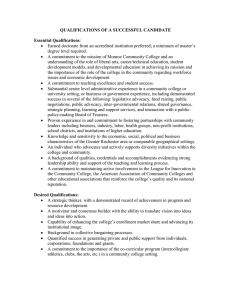
#1 – Develop Diversity in the Position Description
Working definition of “diversity”
In a group, diversity is the array of important human differences (characteristics that affect people’s
experiences within a social system) present in its members. A diverse group includes members with
many different life experiences related to their identities, cultures, abilities, circumstances, histories,
or other characteristics.
As a value, diversity is our eagerness to benefit from the strengths of our human differences,
coupled with our commitment to equity and pluralism. When we value diversity, we are not
satisfied unless multiple perspectives, approaches, experiences, and ways of knowing are present,
because these are critical to productivity, creativity, and innovation. We commit ourselves to
ensuring that all people experience fairness, inclusion, hospitality, and respect.
Framing Questions
1. What is the mission of the college and of the hiring unit?
2. What is the current context at the college and in the hiring unit—what is new, what is changing,
what is challenging, what is exciting, what is needed to attain the future that our mission describes?
3. What is the present context for diversity at the college and in the hiring unit—what is new, what is
changing, what is challenging, what is exciting, what is needed to achieve our preferred future?
Who else is needed to help us answer this question?
4. What is the mission of the position you are filling?
a. What is the purpose of the position—why does it exist?
b. What are the position’s top priorities?
c. How does the work of the position contribute to the mission of the unit and the college?
d. How does it impact colleagues, students, the college, and the community?
e. Should the purpose be refined to more effectively address the present context for diversity?
5. How is diversity related to the work of the position? For example,
a. Will the appointee interact with a diverse group of colleagues, students, stakeholders,
clients, and/or customers?
b. Will the appointee engage in teaching, scholarly inquiry, service, or other job duties that are
directly or indirectly related to diversity and inclusion?
c. How frequently will the appointee need to understand and work respectfully/effectively
with multiple aspects of human difference? In what kinds of situations?
d. What perspectives, experiences, knowledge and skills will the appointee need to perform
the diversity or equity-related work of the position?
6. What qualities or characteristics would allow a person to do this job superbly?
7. What other unmet unit needs outside the immediate position duties might hiring a new colleague
allow the unit to address (depending on the appointee’s abilities/ skills/life experiences)?
Copyright ©2013 Oregon State University Office of Equity and Inclusion
All rights reserved.
Writing the Position Description and Announcement
See Section 2 “Diversity Language in the Position Description” for sample language as you write:
Position summary: write a brief overview of the college and hiring unit, and describe the
mission of the position, based on your answers to the first 5 “framing questions.”
Position duties: describe in more detail the top 3-5 functions of the position, using specific
present-tense action verbs.
Position qualifications: identify the most important qualifications for the position in each of
these three categories. Include diversity skills and performance qualities/characteristics.
o BASIC QUALIFICATIONS - measurable minimum qualifications such as degrees or
other professional certifications;
o OTHER REQUIRED QUALIFICATIONS – additional critical qualifications that are
necessary to perform the duties of the position, but are not really “measurable.”
For leadership positions, “a demonstrable commitment to promoting and
enhancing diversity” (or similar) must be a required qualification;
o PREFERRED/SPECIAL QUALIFICATIONS – qualifications which would enhance the
appointee’s ability to perform the duties of the position successfully—include
qualifications related to “framing questions” 6 and 7 in this section. For all nonleadership positions, “a demonstrable commitment to promoting and enhancing
diversity (or similar) must at least be preferred, and may be required.
Screening criteria: test the accuracy, inclusiveness, and flexibility of your draft qualifications
by developing screening criteria for each one using the process described in the SA
Handbook. If needed, adjust qualifications based on insights you gain from this step.
Application process: decide what materials you need to evaluate a candidate’s
qualifications—it is typical to request a summary of education and employment (resume,
CV, applicant profile), a letter of application addressing how the candidate meets the
qualifications for the position, and the contact information for three or more professional
references. Some application systems allow you to request that applicants to respond to
particular questions related to their qualifications for position. Examples include:
o Please describe your teaching philosophy
o Please describe your research plans
o Please explain how you have demonstrated your commitment to diversity in your
current or previous employment.
Position announcement: use the position description to write a position announcement
and position advertisements. Make the language engaging and attractive—market the
position, the university, and the community to a diverse audience of prospective applicants
(see #2-Diversity Language in Position Description).
Copyright ©2013 Oregon State University Office of Equity and Inclusion
All rights reserved.
#2 – Sample Diversity Language in the Position Description
About the University
The University is engaged in building a culturally diverse educational environment.
Each member of the university community contributes to the development and
maintenance of a healthy and equitable working environment in which diversity is valued.
The University is committed to building a culturally diverse and pluralistic faculty committed
to teaching and working in a multicultural environment.
OSU is committed through continuous improvement to be a collaborative, inclusive and
caring community that strives for equity and equal opportunity in everything we do; that
creates a welcoming environment and enables success for people from all walks of life; and
that shares common, fundamental values grounded in justice, civility and respect while
looking to our diversity as a source of enrichment and strength.
Since 2007, the university has experienced a period of unparalleled growth. The total
student body has increased by 34%, enrollment of US students from underrepresented
groups has increased by 76%, and international student enrollment has increased by over
250%. Over the last three years, a Provost’s cohort hiring initiative enabled academic units
to establish and fill over 100 new faculty tenure lines.
The University particularly seeks candidates interested in contributing to the diversity and
inclusive excellence of the academic community through research, teaching, and outreach.
About the Department/School/College
The department/school is committed to enhancing the diversity of the university
community and curriculum.
The department/college is particularly interested in candidates who have experience
working with students from diverse backgrounds and who have a demonstrated
commitment to improving access to higher education for disadvantaged students.
The College develops multi-culturally competent researchers, scholars, learning leaders, and
practitioners who make a difference by promoting innovation, social justice, and lifelong
learning with a focus on STEM and cultural and linguistic diversity.
We value a collaborative, interdisciplinary approach to research and to teaching learners of
all ages and cultural and ethnic backgrounds.
Faculty in the School have identified Global Justice as the School’s central theme, with
emphases in social and environmental justice, food insecurity and food sovereignty, and
Latino/a Studies.
Copyright ©2013 Oregon State University Office of Equity and Inclusion
All rights reserved.
About the Position
Successful candidate will work strategically with diverse colleagues, students, and
community members.
Position requires active engagement in learning and practicing principles of social justice
and inclusion, both in the classroom and through co-curricular activities.
Position facilitates a work environment that encourages knowledge of, respect for, and
development of skills to engage with those of other cultures or backgrounds.
Successful teaching will foster a commitment to diversity as a learning outcome, because it
enhances our education and provides tools to be culturally respectful, professionally
competent, and civically responsible.
Position is part of a 35-member new faculty cohort in strategic areas with an emphasis on
interdisciplinary research and teaching.
This position is part of a 3-position cohort of assistant professor positions in the unit, with a
collective focus on social and environmental justice.
Provides nutrition information and coaching to multicultural/multi-lingual stakeholders.
Qualifications
Demonstrated commitment to equity, inclusion, and diversity.
Demonstrated interest in developing/implementing curricula addressing multicultural issues
Experience with a variety of teaching methods and/or curricular perspectives
Demonstrated knowledge of effective strategies for working with diverse faculty, staff, and
students
Successful candidates must be committed to working with diverse colleagues, students, and
community members.
Position requires active engagement in learning and practicing principles of social justice
and inclusion
Applicants should describe in their cover letters how their teaching, scholarship, and service
will further the goal of building a culturally diverse educational environment.
Applicants should describe how multicultural issues have influenced and/or been a part of
their teaching, research, and/or outreach/service.
Candidates should have a strong record of commitment to human and intellectual diversity.
Candidates should describe previous experiences mentoring students and colleagues from
underrepresented groups.
Demonstrable commitment to promoting and enhancing diversity
Demonstrated success teaching students from different backgrounds with diverse life
experiences and learning styles.
Copyright ©2013 Oregon State University Office of Equity and Inclusion
All rights reserved.





